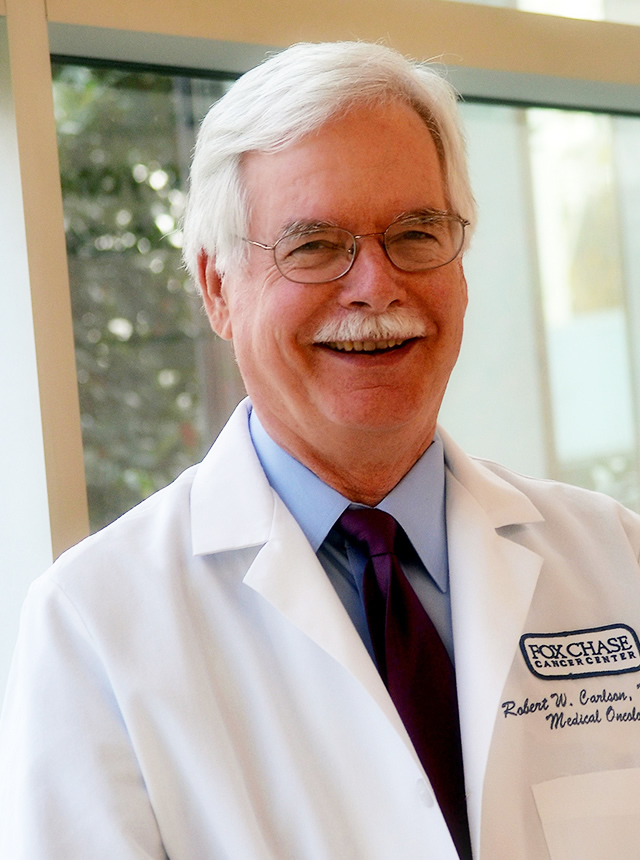PHILADELPHIA (November 10, 2016) – As part of its ongoing commitment to patient safety, Fox Chase Cancer Center is standing with a national campaign to end a dangerous chemotherapy error. Just Bag It: The NCCN Campaign for Safe Vincristine Handling, launched today by the National Comprehensive Cancer Network® (NCCN®), encourages health care providers to adopt a policy to always dilute and administer the medication vincristine in a mini IV-drip bag to prevent the improper administration of the drug.
Together with each of NCCN’s 27 members, Fox Chase has adopted a policy in line with this recommendation, and is calling on other medical centers around the nation and world to join suit. NCCN is an alliance of the nation’s leading cancer centers that collaboratively develops the cancer treatment guidelines that set the standard of care around the world to improve the quality, effectiveness, and efficiency of cancer care so that patients can live better lives. Fox Chase was a founding member of NCCN in 1995.
Vincristine is a chemotherapy agent, widely used in patients with Leukemia or Lymphoma, which should be administered intravenously, or directly into the patient’s vein. When it enters the blood, it is highly effective at blocking the growth of cancer by preventing cells from separating. However, vincristine is a neurotoxin that causes peripheral neuropathy when given intravenously and profound neurotoxicity if given into the spinal fluid, which flows around the spinal cord and brain.
Many patients who receive vincristine have a treatment regimen that includes other chemotherapy drugs that are injected into the spinal fluid with a syringe. If vincristine is mistakenly administered into the spinal fluid, it is uniformly fatal, causing ascending paralysis, neurological defects, and eventually death.

“It is our collective responsibility to end this tragic and preventable error once and for all,” said Robert W. Carlson, MD, chief executive officer of the NCCN and an attending physician at Fox Chase. “Taking part in this campaign is the latest of Fox Chase's long-standing efforts to improve patient safety. I'm proud that my home institution is among the NCCN members leading the way in encouraging every hospital that treats patients with cancer to ‘just bag it.’”
Fox Chase’s policy to use a mini IV-drip bag, and never a syringe, to administer vincristine renders it impossible to accidentally administer the medication into the spinal fluid and greatly decreases the chances of improper dosage. In addition to being supported by NCCN and all of its member centers, this policy is recommended by leading medical organizations including the Institute for Safe Medication Practices, the Joint Commission, the World Health Organization, and the Oncology Nursing Society.
Surveys issued by the Institute for Safe Medication Practices (ISMP) show that over time, more hospitals have adopted a policy to always bag vincristine. According to ISMP data, the number of hospitals that have fully implemented the policy across their practice nearly doubled between February 2014 and February 2016. Earlier surveys indicated a similar increase between 2005 and 2012. Still, only about half of all respondents indicated that they have implemented the policy in all treatment settings, indicating that there is a long way to go.
With 125 known cases of accidental death in the United States and abroad since the inception of vincristine use in the 1960s, this error is relatively rare. Still, it is unique in its level of mortality. Improvements in practice over the years, including manufacturer- and pharmacist-issued warning labels, have reduced the number of deaths, but the error continues to occur and cases have been reported in the United States as recently as 2011.
Diluting vincristine into a mini IV-drip bag may entail a change in practice for some providers, but it is well worth the outcome of avoiding preventable deaths, according to Carlson. “One more life lost is one too many. We are thankful to Fox Chase and all of our Member Institutions for joining us in the effort to end this devastating error for good.”
For more information about Just Bag It: The NCCN Campaign for Safe Vincristine Handling, visit NCCN.org/justbagit. For more information on patient safety at Fox Chase, please see https://www.foxchase.org/.